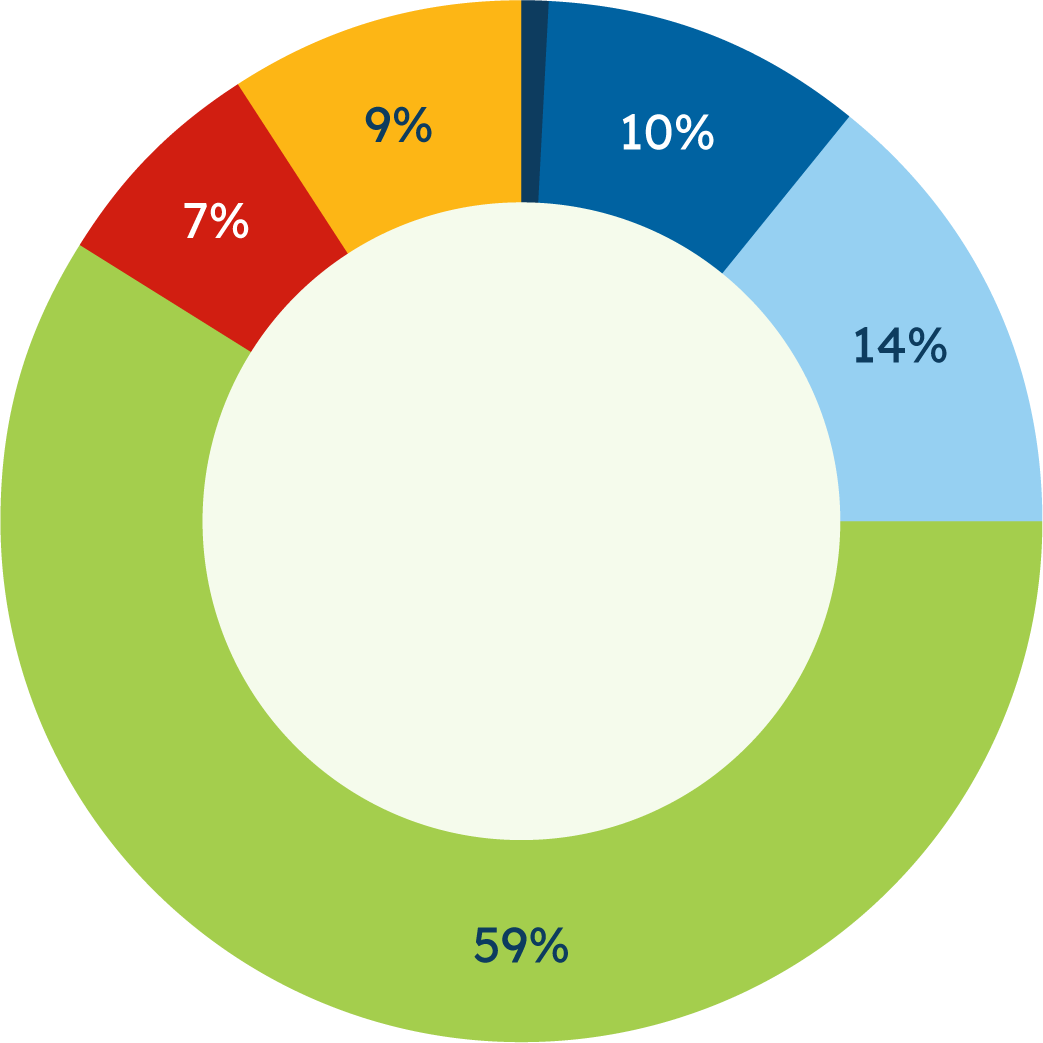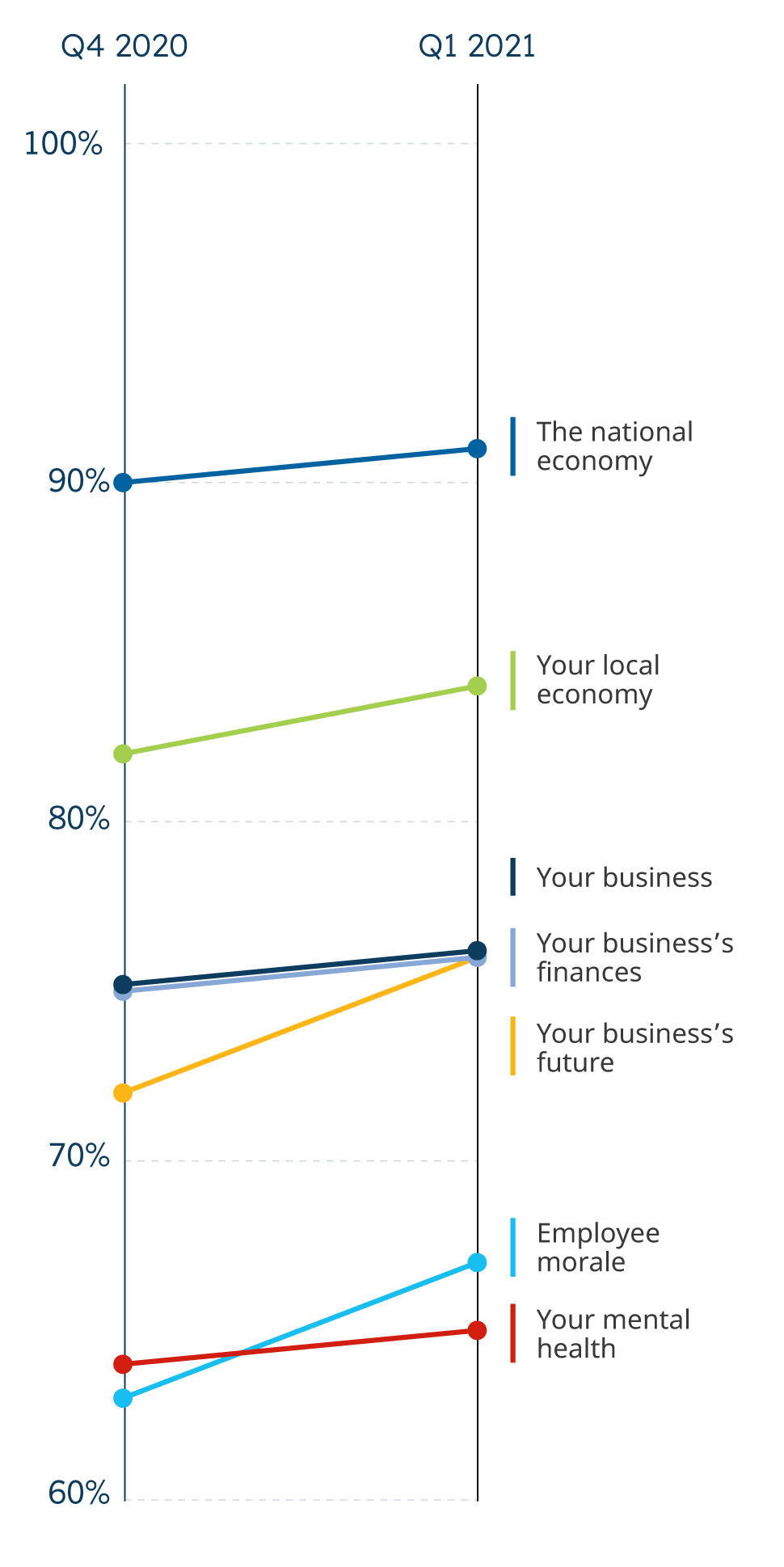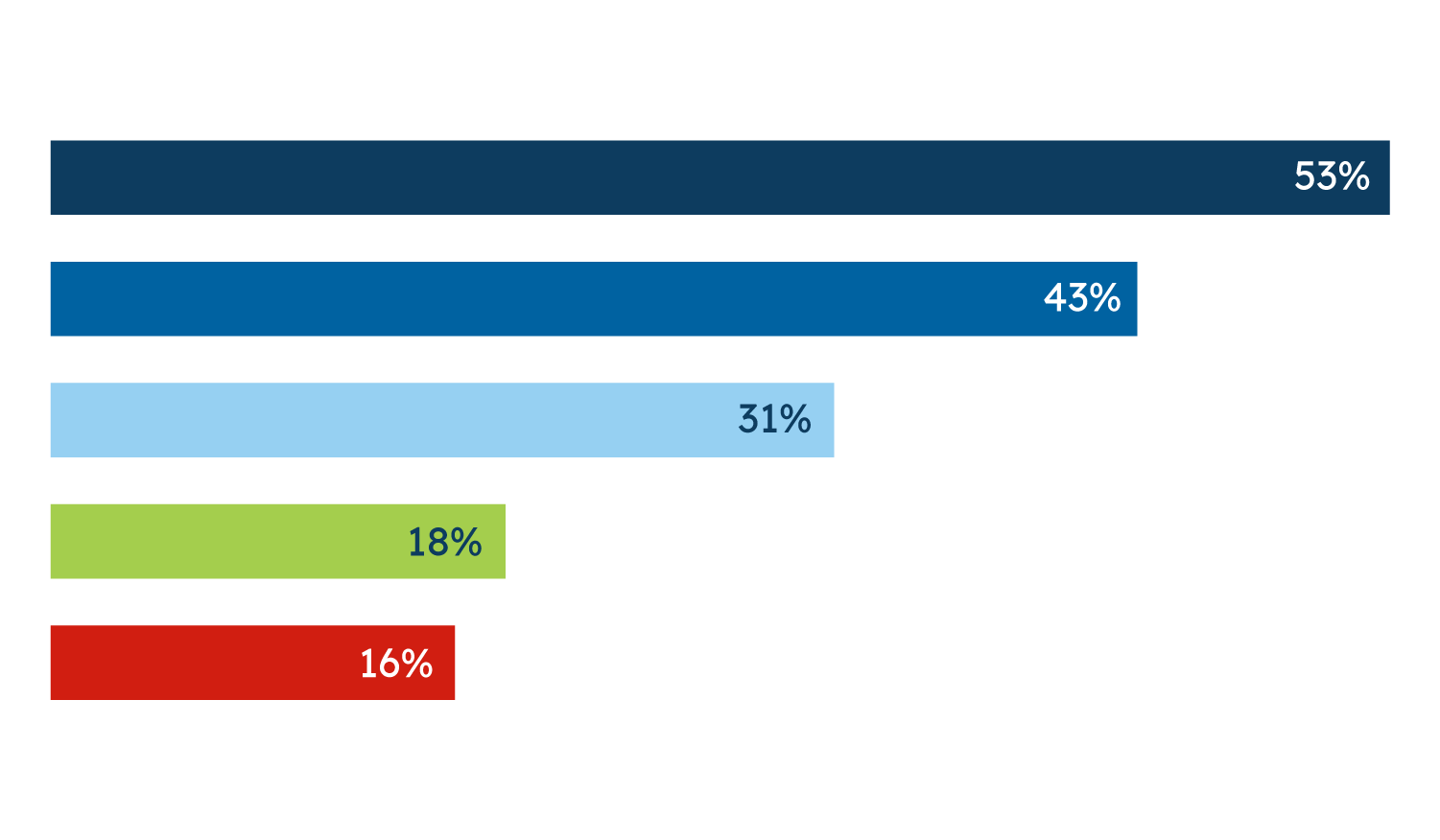The Road to Recovery

The distribution of coronavirus vaccines is providing small business owners with signs of optimism, but most see a long road ahead before the business climate returns to normal.
A majority (54%) of small businesses say the availability of vaccines has made them feel more optimistic about their own business’s future. However, a third (32%) say it has made no impact on their outlook.
59% of small retailers said the vaccines made them feel more optimistic, while 52% of professional services firms said the same. Among regions, 61% of Northeastern small businesses said the vaccines made them feel more optimistic while 48% of Southern small businesses said it made them feel more optimistic (59% in the Midwest and 54% in the West said vaccines made them more optimistic). Larger small businesses tend to be more positive about the effect of the vaccines. 63% of small businesses with more than 20 employees say they are feeling more positive due to vaccine distributions, while small businesses with fewer employees are less likely to share the sentiment (52% with less than five employees, 55% with 5-19 employees).
In light of the current circumstances, how long do you think it will be before the U.S. small business climate returns to normal?

However, despite the growing availability of vaccines most small business owners do not anticipate returning to normal anytime soon, a view that’s held over the last eight months. Fifty-nine percent of small businesses this quarter predict it will take six months to a year to get back to normal. This is the highest percent who have said this since the survey started asking this question in March of 2020. 56% said it would take six months-year to return to normal in Q4 2020 and 46% said it would take six months-year to return to normal in March of last year as the full impact of the pandemic first hit.
Across regions, those in the West are the most optimistic about returning to normal in under six months, up eight points from Q4 2020. In contrast, those in the Midwest are the least optimistic about this, falling 11 points quarter-over-quarter. Additionally, larger small businesses with at least 20 employees are the most optimistic about getting back to normal, while those with less employees are more likely to predict a longer return or say they are uncertain. Divisions can be seen across sectors, as well, with services firms drastically less likely to expect normalcy in under six months and more likely to say between six months to a year.
Small Businesses Adapt to a New Normal
The latest survey shows almost half of small businesses now feel they can operate in this difficult, new environment indefinitely—just under a year since the full scale of the pandemic hit. 45% of small businesses say they can operate indefinitely without shutting down in the current environment, up five points from last quarter, 17 points from July, and 22 points from late April 2020 when only 23% said they could operate indefinitely.
Fewer small businesses see having to shut down in the next few months. In Q1 2021, 21% of small businesses said they can operate six months or less without having to shut down permanently. In April of last year 45% said the same, a 24 percentage-point-shift. The coronavirus stimulus package passed in December may be helping here: 39% of small business owners say the stimulus checks made them more confident about their ability to operate.

Pandemic’s Effect on Economy Seen as Biggest Impact
Despite the rollout of the COVID-19 vaccines, most small business owners remain worried about how the virus will affect the economy and their business’s future and finances.
Despite the rollout of the COVID-19 vaccines, most small business owners remain worried about how the virus will affect the economy and their business’s future and finances.
Three-quarters of small businesses are concerned about the virus’s impact on their business (75% in Q4 2020 vs. 76% this quarter). Worries regarding their business’s finances are nearly unchanged from last quarter as well: 76% are concerned for their business’s finances (75% in Q4 2020).
Across sectors, retailers are most likely to be concerned about their business’s future (80%, up eight points from Q4 2020) and employee morale (76%, up eight points from Q4 2020). Last quarter retailers were among the least likely to be concerned across these measures, presenting a stark change in attitudes and outlook.
The smallest businesses (with less than five employees) are least likely to be concerned about the impact of the pandemic on their business when compared to larger small businesses (74% with less than five employees, 77% with 5-19 employees, 84% with more than 20 employees). Adding to this, the smallest businesses are also least likely to be worried about its impact on their business’s future, employee mental health, and morale.
Still, the overwhelming concern this quarter remains COVID-19’s impact on the economy. Similar to findings last quarter, nearly all small businesses are concerned about the pandemic’s effect on the national economy (91%), with a clear majority expressing the same about the local economy (84%).

Most Small Businesses Plan to Require Staff Vaccinations
The survey also found that a majority of small businesses are likely to plan to require that their employees get vaccinated against COVID-19. Around half (52%) of small businesses are likely to require employee vaccinations, but 20% say they are not at all likely to do so.
For those that did not say they are “not at all likely” to require it, their main reasoning for requiring it is wanting staff to be healthy (53%). Another 43% say they would do so because it is the right thing to do.
The majority of small business owners intend to get a coronavirus vaccine. Overall, 70% of small business owners say they are likely to get the COVID-19 vaccine as soon as it is made available to them, 28% say they are unlikely to do so. Getting a vaccine is most prevalent with small business owners in the Northeast (81%), veteran-owned small businesses (81%), those very concerned about COVID-19’s impact on their business (80%), and those in operation for 11 to 20 years (79%).
Retailers are the most likely to require employee vaccinations (63%), with more than a third (37%) saying they are very likely to do so. In comparison, 55% of manufacturers and professional services firms are likely to require it, while just 40% of services firms say the same.
Why would you require your employees to get the COVID-19 vaccine once it’s readily available?

Perhaps unsurprisingly, the greater the number of employees, the more likely the business is to require employee vaccinations: 60% among those with 20 or more employees, 53% among those with 5-19 employees, and 50% among those with fewer than five employees plan to require the vaccine.
Small businesses are poised to make changes to their operations once vaccines are more widely distributed. The most commonly cited changes small businesses plan to make are:
• 24% will expand in-person offerings for customers
• 24% will increase hours of operations
• 21% will change safety requirements (i.e., mask requirements, temperature checks)
• 20% say they will change their business occupancy or capacity limits
Small Businesses Step Forward on Mental Health, Employee Morale
Adapting to a starkly different economic reality has had an impact on individuals, families, and workers. One consequence of the pandemic has been that small business employers are increasingly preoccupied with the mental health of their staff—and their own mental health. What’s more, small businesses are taking concrete steps to help employees improve their mental health and navigate these difficult times.
With 67% of small business owners saying they are concerned about employee morale and another 70% concerned about employees’ mental health, a majority (60%) say their business is actively addressing employee mental health as a priority.
Minority-owned and veteran-owned small businesses are more likely to be concerned about employee mental health (67% for non-minority-owned and 82% for minority-owned; 68% for non-veteran-owned and 81% for veteran-owned). Younger generations are also more likely to be concerned about this: 77% of Millennials and Generation X say they are concerned about employees’ mental health compared to just 58% of Baby Boomers and older generations. Minority-owned small businesses are also more likely to be actively prioritizing employee mental health right now (70% for minority-owned vs. 57% non-minority-owned).
Across all small businesses, most (67%) say employees have talked openly about financial and personal struggles. Most (73%) offer at least some kind of mental health or wellbeing resource. The most common mental health resources on offer from small businesses surveyed include:
- Encouraging mental health breaks during work hours (28%)
- Offering mental health days/flexible paid time off (24%)
- Having discussions about mental health, self-care, or stress management (22%)
- Organizing check-in meetings with employees to discuss mental health and wellbeing (22%)
Minority-owned small businesses (88%) are more likely than non-minority-owned small businesses (68%) to provide employees with some sort of mental health and wellbeing resources.


